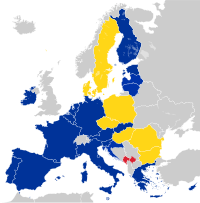European Economic and Social Committee
| European Economic and Social Committee | |
| Official emblem of the EESC | |
| Established | 1958 |
| Type | EU body |
| President | Mario Sepi |
| Members | 344 |
| Represents | Employers, employees and various interest groups |
| Powers | Advisory only. |
| Seat | Delors building, Brussels |

| |
| This article is part of a series on |
 |
|---|
|
|
The European Economic and Social Committee (EESC or EcoSoc) is a body of the European Union (EU) established in 1958. It is a consultative assembly composed of employers (Employers' organisations), employees (trade unions) and representatives of various other interests. It is similar to the Committee of the Regions, with whom it shares the Delors building in Brussels, Belgium as its seat.
Role
It was established by the Treaty of Rome of 1957 in order to unite different economic interest groups to establish a Single Market. The creation of this committee gave them an institution to allow their voices to be heard by the European Commission, the Council and the European Parliament.
The role of the EESC is purely consultative. However, the Treaty of Maastricht considerably enlarged the Committee's domain. Its influence now extends to matters such as social policy, social and economic cohesion, environment, education, health, customers protection, industry, Trans-European Networks, indirect taxation and structural funds. It is questionable, however, whether this expanded scope truly gave it any more authority. On certain issues the EESC works in partnership with the Committee of the Regions.
In latest years the Committee has taken up the challenge of civil society, opening up its forum to representatives of all sectors, developing two complementary missions:
- Involving civil society organisations more in the European venture, at both national and European level,
- Boosting the role of civil society organisations in non-member countries or country groupings where the Committee is furthering structured dialogue with civil society organisations, and promoting the creation of consultative structures based on its experiences, not least in the countries applying for EU membership, the Mediterranean partner countries, African, Caribbean and Pacific countries, India, China, Latin America (Mercosur) and Brazil.
Operation
It is mandatory for the Committee to be consulted on those issues stipulated in the Treaties and in all cases where the institutions deem it appropriate. The EESC may also be consulted on an exploratory basis by one of the other institutions, and may issue opinions on its own initiative (around 15% of its opinions are own-initiative opinions).
Own-initiative and exploratory opinions often raise the awareness of decision-making bodies, and of the Commission in particular, about subjects which have hitherto barely attracted their attention, if at all. Exploratory opinions drawn up at the request of other institutions before the Commission has even drafted its proposals enable the various components of organised civil society represented within the EESC to express the expectations, concerns and needs of grassroots stakeholders.
The Committee adopts on average 150 opinions a year on a wide range of subjects concerning European integration. It therefore plays an active role in the processes of shaping Community policies and preparing Community decisions.
Membership
Currently, EESC membership numbers 344 (same as the Committee of the Regions). The number of members per EU state varies according to the population of each state (see table below for state-by-state membership figures; the breakdown is the same for the Committee of the Regions). Members of the EESC are divided into three groups of equal number, employers, employees and a third group of various other changing interests such as: farmers, consumer groups, professional associations and so on.
Members are appointed by the Council (by qualified majority) following nominations made by the government of the respective Member State. However, once appointed, the members are completely independent of their governments. They have a renewable term of office of five years. The President of the EESC, elected for two-and-a-half year terms, is Mario Sepi[1] and the Secretary General is Martin Westlake.
| Members | States |
|---|---|
| 24 | Germany, France, Italy, United Kingdom |
| 21 | Poland, Spain |
| 15 | Romania |
| 12 | Belgium, Bulgaria, Greece, Netherlands, Austria, Portugal, Sweden, Czech Republic, Hungary |
| 9 | Denmark, Finland, Ireland, Lithuania, Slovakia |
| 7 | Estonia, Latvia, Slovenia |
| 6 | Luxembourg, Cyprus |
| 5 | Malta |
Abolition
This article may lend undue weight to certain ideas, incidents, or controversies. |
It has been criticised[according to whom?] for becoming redundant in light of the European Parliament's increased powers and that it is now simply reproducing Parliament's work. Furthermore it does this without a democratic mandate and hence "helps to strengthen corporatism at the expense of democracy”. As a result, a written declaration was put forward by Nils Lundgren and Hélène Goudin of the euroskeptic June List in 2007 calling for the committee's abolition.[2] Most observers[who?] consider it is only a matter of time before it is abolished. However, since Treaty of Lisbon maintains this Committee, any such change would require amending the Treaties again.
See also
- European Trade Union Confederation
- BUSINESSEUROPE
- European Centre of Enterprises with Public Participation and of Enterprises of General Economic Interest
- United Nations Economic and Social Council
References
- ^ http://www.eesc.europa.eu/organisation/bureau/index_en.asp
- ^ EESC abolition?, European Voice 11.10.2007




